Charter'97 Marks 25 Years Today
59- 10.11.2022, 14:35
- 19,314
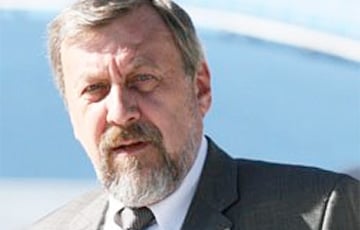
Thanks to everyone who are together with us.
Today, November 10, marks the 25th anniversary of the Charter'97 Citizens' Initiative.
Andrei Sannikov, the international coordinator of Charter'97 and the leader of the European Belarus Civil Campaign, told the Charter97.org website about the creation of the Citizens' Initiative, its influence on the situation in the country and the world, and he also indicated new available opportunities for Belarusians today.
— In 1996, you acted in an exceptional manner for those times and left the post of Deputy Minister of Foreign Affairs of Belarus as a sign of protest. In November 1997, the Charter'97 Citizens' Initiative. was already created. What significant events have taken place during this time?
— The main event is the so-called "referendum" of Lukashenka in 1996. This helped him to usurp the power in the country and eliminated the principle of separation of powers, subordinating the judicial and legislative branches. The day of the "referendum" is the exact date of the beginning of the construction of the collective farm dictatorship in Belarus.
Already just before the usurpation of power, it was clear that the country began to rapidly run into trouble, so it was necessary to react. Many thought at that time about how to resist the Lukashenka regime and what could be done.
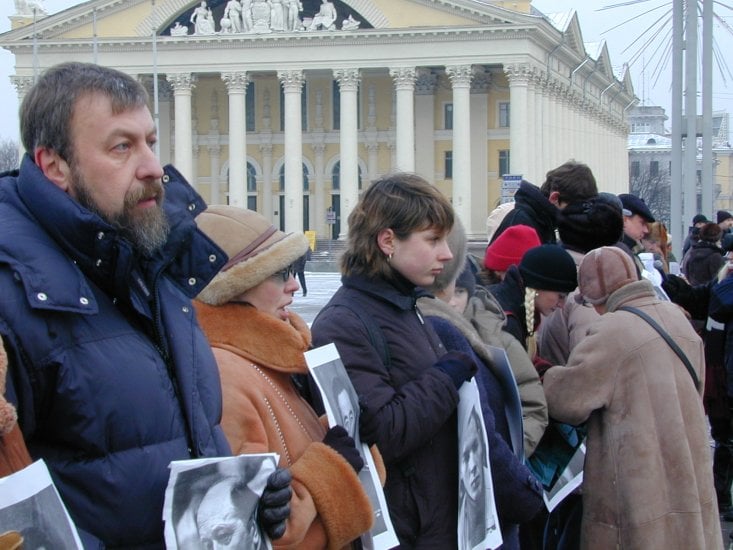
After the "referendum", the Supreme Council was routed, and the situation required serious responses to the challenges that had arisen among the Belarusian society.
— U.S. President John F. Kennedy is credited with the phrase: "Success has many fathers". Perhaps, over time, we will hear different stories of the creation of Charter'97. How did it really happen?
— A wave of repression was rising in Belarus. The authorities began to destroy independent media. Journalist Pavel Sheremet, who made a story about the "leaky" Belarusian border, was in prison. They took journalist Aleh Biabenin into the forest and threatened to kill him if he did not stop his activities and stop writing the truth. This was the impetus for the creation of Charter'97.
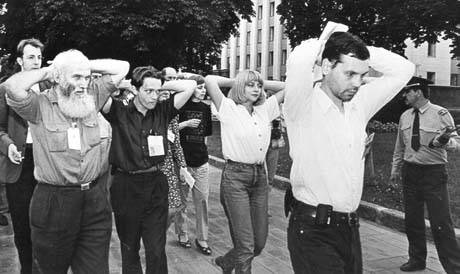
It was necessary to respond to this, and the idea arose just from journalists to start a wave of solidarity. Interesting people gathered at my place. Piotr Martsau, Uladzimir Matskevich, Viktar Ivashkevich, Dzmitry Bandarenka, Mikalai Khalezin and many others. We were discussing what we could do all the time. The idea of Charter'97 arose out of these conversations.
Initially, several tasks were set: first, to unite people of different views and different political affiliations. Secondly, to direct this initiative towards the release of political prisoners and the prevention of new imprisonments, to create an effective mechanism of solidarity. More effective forms of protection of human rights, the fight against the regime — the answer had to become Charter’97.
It is clear that the name was taken as a parallel to the Chechoslovakian Charter 77. The text of the Charter'97 statement is quite simple and understandable for everyone. It became the product of collective creativity. And in general, we worked in teams: we had new ideas, and experienced ones were starting implementation. I think that the text of the Charter and the campaign to collect signatures have become a good impetus for our further activities.
— There were many initiatives in Belarus to unite people to fight Lukashenka. But it was the Charter'97 declaration signed by 100 famous Belarusians and 100,000 citizens of the country. Why did the idea "shoot"?
— Because people with a reputation, known in the country, were behind the start of the campaign. We consciously collected signatures from people from different professional groups, different layers, with different biographies, but well-known. In addition, independent journalists worked intensively with the press.
This combination and the credibility that the initiators of the Charter’97 had worked for the popularity of the campaign to collect signatures. In reality, more than 100,000 of signatures were gathered. At some point, we simply stopped counting them, because it was already clear: there is support for the initiative and we need to start working, and not just collect signatures.
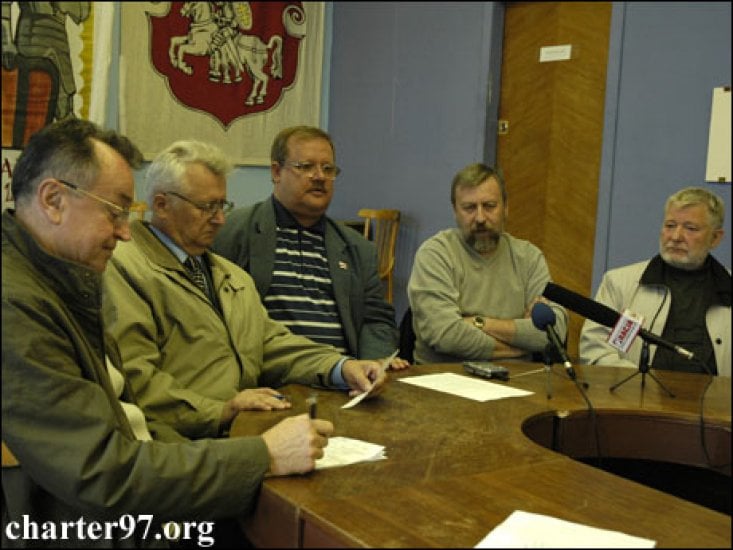
Unfortunately, it happens so often in Belarus: there is some collection of signatures and that's it, no further action. We definitely wanted to avoid that.
— Let's talk about the work of the initiative: which political campaigns related to the Charter'97 were the most memorable to you?
There are enough of them. First, I would like to point out the main things: we immediately began to create a mechanism of solidarity and assistance to all those who suffered from the repression of the Lukashenka regime.
Prior to the Charter, there were mainly “corporate” solidarity mechanisms: each party helped “its own” and did not pay attention to the activists of the other party, the business unions believed that they would cope with the problems of repression themselves… A serious mechanism was needed in which everyone would be involved in the struggle for liberation if a person was sitting for political reasons, and everyone would provide assistance to the victims of repression.
And it happened. The solidarity system that included domestic and international elements was established in Belarus largely due to the Charter. Relations with international human rights organizations, governments and parliamentarians of democratic countries were established. They also were helping to prevent pressure on Belarusians and helping the repressed people. At this time, we closely cooperated with the Viasna Human Rights Organization headed by Ales Bialiatski.
As for political campaigns, there were quite a lot of them, and all of them were related to the current political situation in Belarus. It should be noted that they were not necessarily held under the Charter’97 brand: for example, the idea of the Freedom Marches was born inside the Charter and the main drivers were the members of our organizing committee, but the organizers were a wider circle of leaders.
The main feature of these campaigns is that they were most often associated with protests. We have invariably placed an emphasis on the “street”: we understood that from cabinets and offices, using the NGO format, you can achieve little. You have to go to the streets and defend your rights. The regime in Belarus no longer understood other forms of communication.
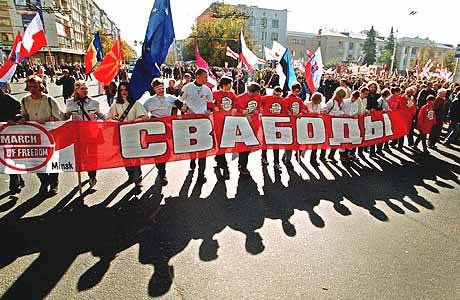
Therefore all notable actions were connected with street protests: The Anti-Fascist march, “Freedom Marches”, “For Better Life” marches, and “Pots and Pans Protest”. All the job was done by the people who were behind the Charter'97 initiative. The Organizing Committee of the Charter helped the formation of the Zubr legendary youth resistance movement.
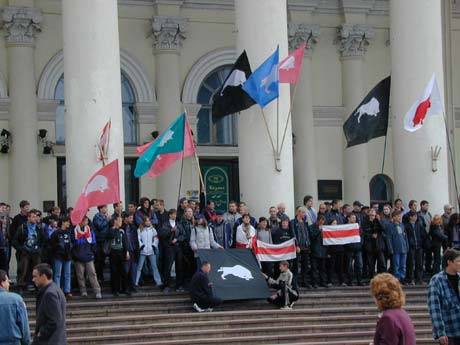
I would also like to mention the opening of the first embassy of the Belarusian democratic forces in Brussels. This happened in 1998 and greatly contributed to raising the Belarusian issue in the European institutions and NATO.
— How did the creators of the initiative have the idea to make a news website of the same name? What were the first steps?
— The first steps were to create a webpage. It was something completely new and incomprehensible at that moment.
Let's remember that time: there was already such a thing as a personal computer, such a phenomenon as the Internet — but everything was very static. For example, how did some public initiatives and even political associations and centres work? They created a page for themselves and posted some kind of charter or something there and that's it. Whether to update further or not — nobody cared, there were such static information sheets on the move.
We immediately solved, that it is necessary to work differently, because must be feedback and people must see that this initiative is a living organism. Gradually, our site was the first to become such a dynamic media.
Of course, this is Aleh Biabenin’s great achievement. He was the engine and founder of the site and at that time he was the best at thinking about what and how to do with the Internet.
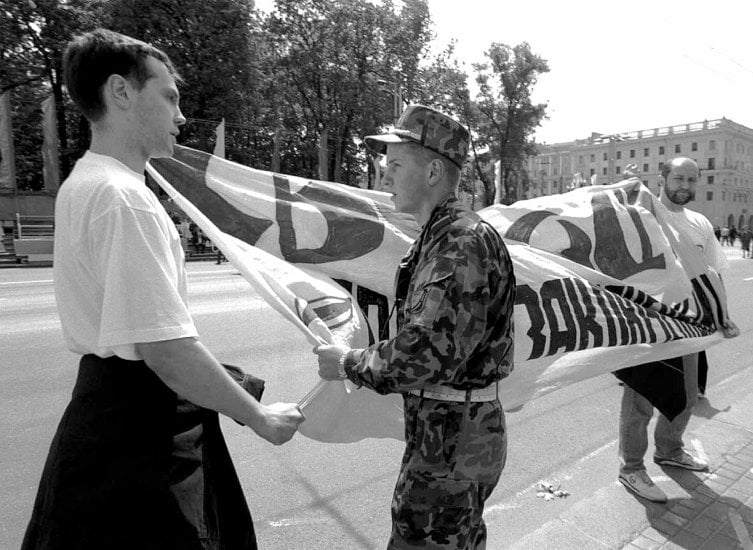
— Ales Bialiatski, one of the famous Belarusians who signed the Charter, became this year a Nobel Peace Prize winner. Who else among the world's famous people came out of the “charter coat”?
— We have not only the Nobel Laureate Bialiatski signed Charter 97, but the Nobel Laureate Sviatlana Aleksievich also signed this declaration. It is worth remembering this: many famous people signed the Charter’97, promoted the initiative, and participated in our activities.
These, unfortunately, are Ryhor Baradulin, Nil Hilevich, and Henadz Buraukin, who have already left us, as well as such powerful opposition leaders as Henadz Karpenka, Viktar Ivashkevich, Valery Shchukin, as well as many other political activists and party leaders. Almost all well-known people in Belarus at that time, who participated in the life of civil society, signed the Charter’97. So I wouldn't single out anyone in particular.
— And then which of your allies would you like to mark today as the successors of the "Charter case"?
— First of all, i would like to mention Dzmitry Bandarenka, the coordinator of the European Belarus Civil Campaign, and Natalia Radzina, the editor-in-chief of the Charter97.org webpage. But let's sort things out. The initiative has now taken other forms, and the Charter’97 brand has now stuck only with the webpage of the same name, which exists thanks to Natallia Radzina. She joined us in the early years of the initiative and was involved in journalism, and later became the editor-in-chief of Charter97.org.
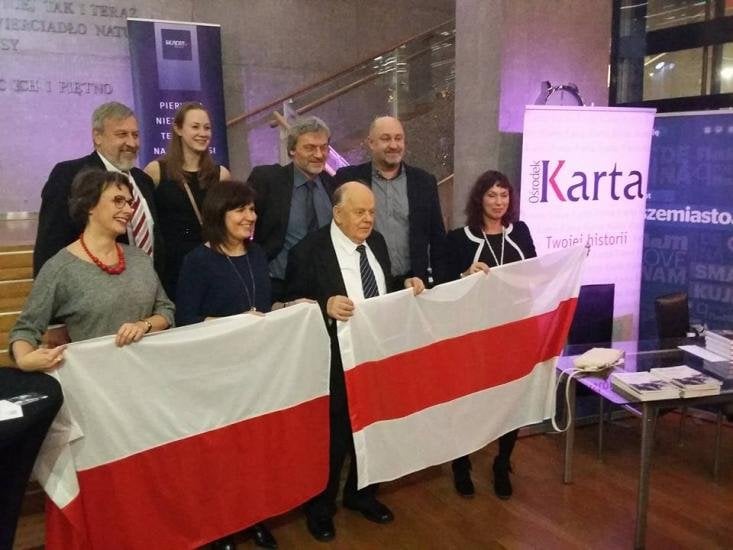
There are objective historical reasons for the transformation of the citizens' initiative. Lukashenka and his “oprichniks” [security services - Ed.] were chasing the Charter’97, various “laws” were adopted in order to ban the activities of the Charter. Even fake, communist Charters were created. It was the most visible, bright and active in Belarus. Therefore, at some point, a “law” was passed, prohibiting civil initiatives, actions and campaigns in Belarus.
We have always had a rule: do not register under this regime, and do not comply with any instructions that would mean begging the regime for permission to act. We have always believed that we act legally, in accordance with the Universal Declaration of Human Rights, and in this, we are protected by a legal document, which is formally recognized even by such dictatorial regimes as Lukashenka's.
But in order not to frame people, we once removed the name "Citizens' Initiative", left the website and transformed it into various forms of activity: human rights, politics, public, everything that is called the struggle for freedom.
— How do you assess the results of 25 years of activity? What effect did it have on the country and the world?
— Firstly, despite the fact that this chaos has been going on in our country for so many years, Charter’97 did not allow to drop the honour of Belarus and Belarusians in the world. Speaking about the initiative and our other campaigns, we've been opposing the dictatorship and any recognition of the dictatorial regime in the world, any justifications for this regime, any contacts with Lukashenka, despite the existence of a huge number of repressed people in Belarus.
The Charter has become such a unifying center that allowed to say that Belarus will not submit to either the dictatorship of Lukashenka or the occupation by the Kremlin. This was the guideline of the Charter, which continues to be the basis of our activity even now.
— The world has changed amazingly after the 2020 Belarusian revolution and the beginning of the full-scale war against Ukraine by Russia. What new tasks and new opportunities do the supporters of democracy have in Belarus?
— Firstly, today Ukraine is also fighting for democracy in Belarus, and this is about 40 million people who oppose the regime with its puppet Lukashenka.
The whole world supports Ukraine. Therefore, thanks to the heroism of Ukraine, thanks to the courage and selflessness of our heroes, the soldiers of the Kastus Kalinouski Regiment, today a unique moment has come for us to liberate Belarus.
This was not the case before. The dictators Putin and Lukashenka crossed the red line by unleashing war, therefore armed resistance is a legal weapon in the fight against the dictatorship. What is happening today in Ukraine directly affects the situation in Belarus. The fact that Ukraine is supported by both NATO countries and the entire democratic world gives us a unique chance.

— One of the founders of Charter 77, Václav Havel, became president of Czechoslovakia in 1989. When will Belarus begin to live according to the principles laid down in Charter'97 and who will be the Belarusian Havel?
— I have great respect for Vaclav Havel, he is important to me in many respects, but I think that we have personalities аs bright and capable of defending their dignity and becoming an example of the struggle for freedom. Belarusians themselves are already serving as an example for other countries.
Our country is rich in bright personalities and heroes. I can name such people as Dzmitry Bandarenka, Viktar Ivashkevich (unfortunately deceased), Natallia Radzina, Mikalai Statkevich, Pavel Sieviaryniec, Yauhen Afnahel, Maksim Viniarski. I can list them in hundreds.
Lastly, I often meet with freedom fighters from different countries and see among them "Cuban" Yauhen Afnahel, and "Bolivian" Palina Sharenda, and "Iranian" Aleh Biabenin. This is the way I would like to perceive our heroes, and not vice versa.
— What would you like to say to the readers of Charter97.org on the day of the 25th anniversary of the creation of the initiative of the same name?
— First of all, I am extremely grateful to the staff of the Charter97.org website. It means a lot to me that so many people "live" for making this website. So thanks to all the people who make it.
I want to tell the readers that this is the only website that, over the course of all these years, has not caved into the “changing world”, but makes it “bend to us”, upholds the truth and does not want to accept any conventions and does not allow any “soft” attitude to the dictatorship.
The principled stand is the most important thing today.











